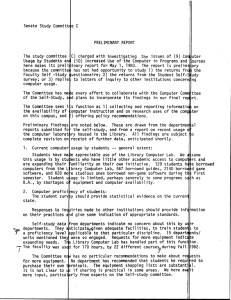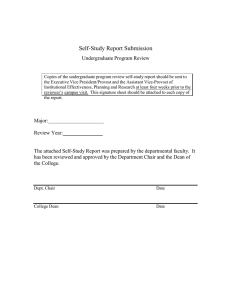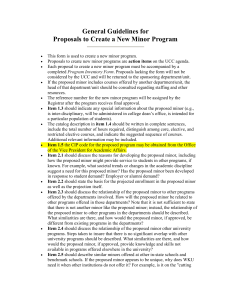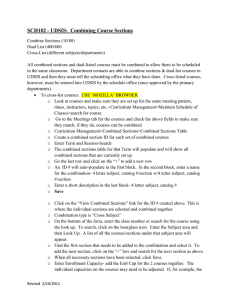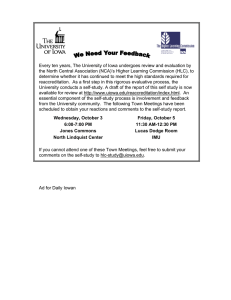Department/Program Review Summary 2012-13
advertisement
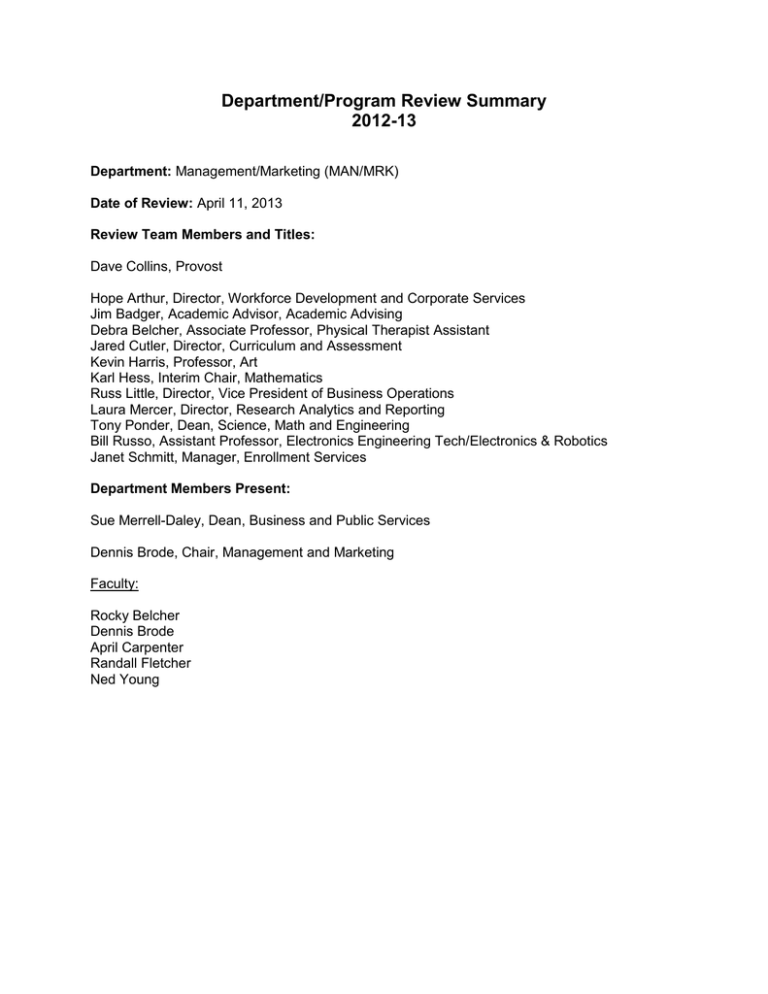
Department/Program Review Summary 2012-13 Department: Management/Marketing (MAN/MRK) Date of Review: April 11, 2013 Review Team Members and Titles: Dave Collins, Provost Hope Arthur, Director, Workforce Development and Corporate Services Jim Badger, Academic Advisor, Academic Advising Debra Belcher, Associate Professor, Physical Therapist Assistant Jared Cutler, Director, Curriculum and Assessment Kevin Harris, Professor, Art Karl Hess, Interim Chair, Mathematics Russ Little, Director, Vice President of Business Operations Laura Mercer, Director, Research Analytics and Reporting Tony Ponder, Dean, Science, Math and Engineering Bill Russo, Assistant Professor, Electronics Engineering Tech/Electronics & Robotics Janet Schmitt, Manager, Enrollment Services Department Members Present: Sue Merrell-Daley, Dean, Business and Public Services Dennis Brode, Chair, Management and Marketing Faculty: Rocky Belcher Dennis Brode April Carpenter Randall Fletcher Ned Young Commendations: The department prepared an extremely well-written self-study that was readable, open and honest regarding opportunities for improvement, and well-supported by data. The department seems to have truly embraced the purpose of the Program Review process as the department stated in the self-study “the department approached the process, not with the ultimate goal of creating the report, but with the goal to better understand and document our curricula, processes, and results”. The department used the process exactly the way it was intended to be used, as an opportunity for discovery, analysis, and self-reflection. The level of self-analysis was truly outstanding, and the review team had few recommendations that were not already mentioned by the department itself in the self-study. While this is a department that does many impressive things, it is also a department that has a culture of willingness to change, a willingness to go to the effort to make an already impressive program even more impressive, a willingness to accept that there are things that could be improved, and a willingness to begin working toward those improvements. One example of this that emerged in the self-study was in regards to the Advisory Board – the department looked candidly at how the Advisory Board was being used, and determined that it was not being leveraged as effectively as a feedback mechanism as it could be. At the time of the development of the self-study the department had initiated conversations about how to approach improving the structure and function of the Advisory Board. This is just one example of the department’s willingness to take a good, hard look at themselves, make an honest assessment of what needs to change, and roll up their sleeves and begin working on it. The department’s concern for the best interests of students is exemplary – for example, the efforts to ensure that students are placed into the BUS.S.AS program if they are planning on transferring, even if it means the student enrolls there instead of in one of the department’s own programs, demonstrates a concern for what is best for the student over what is best for the department, and evidences a true commitment to a studentcentered approach. The faculty in the department have excellent experience and credentials, and demonstrate a high level of engagement both within the department in their work with students, and outside of the department with their involvement in the field and in broader educational initiatives. The faculty’s professional engagement outside of the college is truly a credit to Sinclair. This is a very forward-thinking department – an excellent example of this is the way that the department has adopted online education. By this fall, all of the courses that the department offers will be available online, which demonstrates a considerable amount of foresight and a dedication to increasing the educational options for students. The department appears to have a great capacity for innovative thinking – for example, during the discussion with the review team the subject of low enrollment higher level courses at some locations was brought up, and the department suggested a solution of a hybrid approach where class sessions held at the Dayton campus could be broadcast to the other locations, maximizing resources and avoiding the need to offer low enrollment sections just so students can get the courses they need to graduate. This is one of several examples of the unique problem-solving skills of the department. Another example is in regards to the timing of internships and the department’s discussions of the potential benefits of providing internship experiences earlier in the program to increase student engagement and help students place in-class learning within the context of real-world problems they will encounter in the workplace. The department obviously takes assessment very seriously. The assessment of program outcomes using assignments across multiple sections of a course is highly commendable, and provides an example that other departments should follow. Aggregating this data across sections has been a challenging, painstaking task for the department, but the view it has provided across multiple sections of a course is invaluable, and crucial to program-wide assessment. The review team highly commends the department for its efforts in this area. Moreover, while these efforts have targeted program outcomes, the department also recognizes the importance of general education outcomes, and is grappling with how to implement similar data collection and analysis procedures for assessment of general education outcomes. Assessment is clearly a priority for this department. Recognizing the importance of data is praiseworthy – being willing to put the extra effort and work into collecting and analyzing data is far more praiseworthy, and the department has gone above and beyond in this regard. Many departments talk about the importance of data, the substantial work this department has put into gathering and using data demonstrates an extremely high level of commitment to this ideal. The department has demonstrated exemplary stewardship of college resources – several faculty have transitioned out of the department in the recent years, concurrent with the college experiencing the tightest budgetary times in recent memory. The department’s willingness to forego filling positions and making do with remaining faculty has had a real and substantial impact on the college’s ability to deal with the budget crunch. The department has evidenced a high capacity to do stellar work with fewer resources than it has had in the past, and this is to be commended. The department has recognized problems with transferability for its students, is knowledgeable about what the challenges are, and has worked to find ways to meet those challenges. The work that the department has done providing courses and programs to the incarcerated population demonstrates a high level of commitment to an underserved and marginalized group, and the review team was particularly impressed by these efforts. Recommendations for Action: The discussion with the review team regarding the deactivation of the marketing program and the department’s contemplation of development of a digital marketing program was very enlightening. The implementation of the prerequisite on the TAG marketing course by the state has had an adverse effect on enrollment statewide, and was directly responsible for the deactivation of the program. Considerations of a new digital marketing program will need to include plans for overcoming this barrier. The department has discussed development of a non-TAG marketing course get around this obstacle, and that is a possible approach, although there may be some benefits to working with the state to remove the troublesome TAG prerequisite. However the department chooses to address this challenge, the review team recommends careful consideration and thought regarding the need for a digital marketing program, and if the decision is made to pursue it, careful attention to the development of this program. Transfer possibilities and employment prospects for graduates should be among the major factors taken into consideration as the department explores this opportunity. The department should formalize an approach to making the determination regarding whether this program should be developed. The department should also formalize an approach for deciding whether or not to require internships for all of its students. This possibility is presently at the discussion stage in the department, and the department should develop a clear and explicit rationale for deciding whether or not to implement this idea. The department should be very clear about how this will be decided. An approach for making improvements to the Advisory Board should also be formalized – the department should state explicitly why improvements are needed, what the goals of the improvements are, and what the strategies for achieving those goals should be. As part of the rationale for the improvements, the department should specify how the Advisory Board will function differently than it has in the past, should specify how the structure will differ from what it has been in the past, and a timeline should be developed that will guide the department’s efforts to strengthen its Advisory Board. The department has demonstrated an exemplary level of commitment to the collection and use of data, and has worked hard in this area. The review team has the sense that these data collection efforts could be made more efficient and less onerous through the use of some of the resources offered by other departments. For example, RAR may be able to extract data from multiple sections in Angel more easily than the department can with its current processes. When collection of data becomes resource-intensive, the department is strongly encouraged to consult with RAR, the Provost’s Office, and other areas on campus to see if there aren’t more effective and efficient ways to obtain the data the department needs. It may be appropriate to invite a representative from RAR to a department meeting to discuss some of the services that they can provide. The department has shown a great deal of concern about students knowing the difference between the Business Administration transfer degree and the General Business Management Applied Associate of Science degree. Despite this concern, there appears to still be some confusion among students and others regarding how these degrees differ in terms of post-graduation outcomes and opportunities. The review team recommends that the department find ways to communicate more effectively with students regarding the differences between these degrees. One option may be to have something on the department website that makes the differences between these degrees more clear and explicit. Other efforts at outreach to students and others who may be unclear on the differences may be warranted, especially to Enrollment Services and Academic Advising. The department should come up with a plan with specific actions that are designed to decrease confusion regarding these two distinct degree pathways. Since the department is seriously considering a digital marketing degree, an increased use of social media and other digital platforms may be warranted. Use of these tools by the department may both increase its capacity for educating students in these areas and allow the department to demonstrate to its students the potential for these approaches. Overall Assessment of Department’s Progress and Goals This is an impressive department in so many ways – the commitment to students as evidenced by acting in the best interest of students even if it moves them to a program out of the department, the “forward thinking” culture as evidenced by offering the department’s entire curriculum online, the prioritization of assessment as evidenced by the impressive work the department has done aggregating scores across multiple sections of a course, the willingness to offer educational opportunities to marginalized groups as evidenced by the program and course offerings to the prison population. Above all the credentials, commitment, and quality of the faculty distinguish this department. There are many praiseworthy attributes of this department, and in many areas it sets an example that other departments would do well to follow. The department has a high level of self-knowledge and self-awareness, and there are few things that the review team has noted as opportunities for improvement that the department hadn’t already identified. In many cases discussions have been initiated regarding how these opportunities can be addressed, although these discussion may need to be formalized into specific, strategic plans that are documented and shared with the division dean and the Provost’s Office, as well as being included in the Annual Update submissions in future years. There is no question that the faculty possess the skills required to move the department forward in meeting its challenges. It should be noted that this department has experienced frequent changes in leadership in recent years, and is serving the same number of students with fewer full-time faculty than it has had in the past, making the accomplishments that were highlighted in the self-study all the more remarkable. Institutional or Resource Barriers to the Department’s Ability to accomplish its Goals, if any: There were a number of issues raised in the self-study that will require efforts beyond those of the department alone to resolve. The department made an innovative and promising suggestion that offers a solution to the problem of offering low enrollment sections at locations other than the Dayton Campus so that students can complete their programs – offering these sections via videoconferencing, such that multiple locations can receive instruction at the same time. Implementing this approach would need to be an institutional effort at a higher level than the department could manage by itself. This raises the question of offering programs at locations other than the Dayton Campus – how much of a program can a student complete if they are unwilling to go to the Dayton Campus? This is not as much of an issue for this particular department, because all courses are offered online, but even so some students are reluctant to take online courses. How can we as an institution serve students who start a program at another location but find finishing a program at the Dayton Campus or online to be a barrier to completion? The deactivation of the marketing program was a direct result of a prerequisite that the state put on the TAG marketing course – as a result enrollment decreased statewide for this TAG course. Perhaps the institution needs to attempt to initiate a broader conversation regarding whether this prerequisite is appropriate, and whether the state shouldn’t reconsider it. Aggregating scores across multiple sections of a course is crucial to getting good assessment data – yet Angel provides no mechanism for this to occur. Departments are left to either depend on RAR to extract the data for them, or use a lengthy, onerous, time-consuming process to aggregate the data manually. Since the institution is going transition to another course management system in the near future, an important consideration in the selection of the new system should be the ease with which assessment data can be aggregated across multiple sections of a course. The limitations of Angel in this regard have been an impediment to having a robust assessment strategy in many departments. Like many departments this department mentioned issues with a lack of space. Similarly, the challenges associated with a lack of marketing resources that were mentioned by this department have been echoed by many other departments undergoing Program Review.
